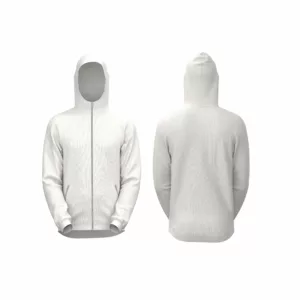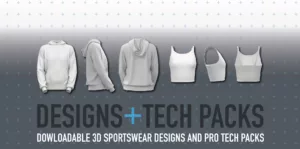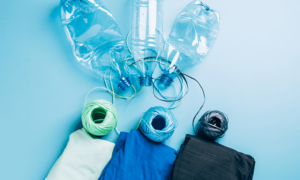As the world wakes up to the decades of damage and toxic products the sportswear industry has produced since the invention of cheap synthetic fibres and plastic now, the demand for sustainable sportswear made with natural fibres has increased dramatically.
Currently, 8 out of 10 clients now request natural fibres or ocean waste fabrics for their sportswear apparel and it’s on everyone’s agenda to switch to sustainable production in the near future to reduce their environmental impact.
There are now many options available from recycling plastic ocean waste to producing fabrics using natural plant-based fibre that uses little of the planet’s resource to grow and also cause no impact to the environment when worn, washed and disposed of.
Fabrics are the largest component to change to a sustainable solution, however, if you want to produce a garment that is completely sustainable or environmentally friendlier, there are now options to develop bespoke sustainable trims and components.
There are also many options on trims and components that are made from natural fibres or use recycled fibre that again provide a more eco solution than traditional trims. The market now has options that include zips made from recycled polyester tapes, teeth and faux leather trims made from materials such as apple or grape skins. This is perfect for creating vegan specific sportswear as well as reducing the amount of product going to landfill.
Recently, we created an outdoor collection for a client that was 100% committed to creating a sustainable and biodegradable range of products that performed for the outdoor enthusiast but protected the planet in terms of production but also throughout the life of the garment when washed and eventually disposed of.
We have produced a range of sustainable garments using long-staple cotton that used ultrafine fibres woven closely together and coated in an eco-friendly water repellent treatment.

The zips were produced using recycled plastic and fishing nets from the ocean, the woven labels used organic cotton and vegetable and plant-based inks and the leather trims that adorned the collection used grape leather. These garments were produced in our factory in Europe that has solar panels on the roof and heat source pumps that produces so much energy, they can power the whole factory for free and pump electricity back to the national grid
Many of our brands are now requesting more sustainable products and we work with several garment trim suppliers around the world that have focussed on sustainable trim over the last 2-3 years. This has allowed us to build our knowledge within this field but also understand what is at the cutting edge of the textile industry.
Leathers, badges, appliques, studs, zips and prints can all now be produced using an environmentally friendly solution using more raw materials rather than the traditional synthetic options, making the whole garment sustainable and biodegradable.
A couple of years ago, we worked with a brand on a sustainable product and buried one of their products alongside synthetic competitors’ products for 8 months. We dug both up after 8 months and the sustainable garments was 60% degradable with the natural nutrients and bacteria going back into mother nature. The synthetic garment came out looking like new, although covered in a bit of dirt, you could have given it a shake and carried on wearing it.
Currently, it is unknown how many decades or centuries it will take for a synthetic garment to degrade as they have only been around for 30-40 years and studies have only just started. It is believed that a typical football jersey or running top could take between 50-100+ years to degrade and the issue doesn’t finish here. When a synthetic fabric does start to degrade, the fibres and components are all produced from toxic synthetics that will then go into the ground, damaging soil and potentially poisoning insects that live underground.
It’s therefore never been so important to start to develop sportswear using sustainable fabrics and trims so that we help preserve our planet and produce sportswear we can be proud of, not just in terms of function and style.
If you are looking to produce sustainable sportswear or would like more information on sustainable fabrics and trims, please get in touch.




